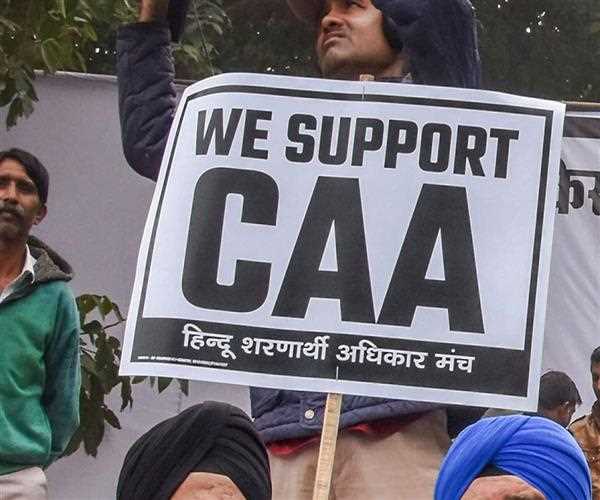
17-Mar-2024 , Updated on 3/18/2024 3:07:16 AM
Do Muslims have to worry from CAA?
The Citizenship Amendment Act (CAA) has triggered an unprecedented discussion and strict conjecture over its necessity and justifiability ever since its implementation. Muslims in India have raised concerns with regard to its impact on the citizenship of the Muslim community as well as the people's constitutional rights. On the other hand, the complex nature of the law makes it important to comprehend it properly so as to correct the impression and quell the fears.
No Harm to Muslims
First of all, the reader needs to interpret that CAA would be in no way jeopardizing the citizenship of Indians Muslims in prior. The bill's main goal is to enable minority communities seeking refuge from neighboring countries that are dominant by a particular religion, mainly Bangladesh, Pakistan, and Afghanistan to get accelerated citizenship. This extends to Hindus, Sikhs, Buddhists, Jains, Parsis, and Christians who arrived in India prior to December 31, 2014.
The Constitution has incorporated this as a feature to provide shelter to people escaping religious persecution and this is certainly not the caste which limits the citizenship of the Indian Muslims. Hence, Muslims in India need not be scared of CAA that having law affects their rights or disputes about citizenship.
Benefit for Minorities
CAA functions as a humanitarian measurement for the religious minorities facing discrimination in other Muslim countries specifically, Pakistan, Bangladesh, and Afghanistan. Being the sufferers of systematic discrimination, these groups often encounter discrimination which is directly linked to their faith, so they are prone to various threats. Through granting its minorities of the existing place of residence the relevantly given privileges, India signifies its devotion to the protection of the freedom of religion and a refuge for those who are being prosecuted.
Similarly, the CAA adheres to the principles of international humanitarian regulatory regime and that too displays the spirit of India's vision worldwide and the concern for minorities. As a result, instead of this being thought of a discrimination, the CAA should be looked at as a first move towards the protection of the rights of a religious persecuted minority in India and upholding its secular values.
Strengthening National Unity
Adherents to the CAA claim that it enhances the spiritual connection amongst people which leads to national unity and integrity. It implies that India is a one-for-all place which meets the challenges that marginalized communities are capable to face and helps affirm its diversity, freedom, and tolerance. Besides, it regulates India as per the laws similarly passed by other countries around the globe, implying a global agreement to refugees and placing security and justice.
Unfortunately, opponents of the CAA often fail to see the good side of its intention to act on the grievances of the most marginalized groups of people. Consequently, the people who are great advocators of national security and growth should consider CAA as a step in a right direction.
Opposition and Political Agenda
However, there is a heated opposition to this law by some of the political parties who provide a legitimization to the law through incorrect information. Criticisms of CAA accuse it to be discriminatory against the Muslims that sends a message of one nation whose population is supposed to be divided on religious lines.
Moreover, there might be a possibility that some terrorist groups and organizations around the world, are monitoring and countering attempts by exploiting this CAA implementation. Besides that, there is some misinformation or certain vested interests regarding the benefits and consequences of immigration attempts which is triggering some people in society and create fear and unrest in minorities. Accordingly, it is relevant to disgrace the false alarms and the politically rooted subjectivity and ask for a straight perspective about the impact of CAA.
Looking Ahead
In conclusion, the CAA is a complex and big legislation that requires careful consideration and analysis. Despite of the fact that On the one hand it attempts to bring relief to the hunted minorities, it is necessary to consider everyone of the stakeholders' worries and in the same way to avoid any group of people to consider itself as marginalized or excluded. The Indian Muslims, especially, should understand that what the act of citizenship do is to categorize those people who would be known legitimately as Indian citizens and not to impede their rights. It signifies that we are making the humanitarian effort to help the unfortunate minorities and at the same time follow truly secular principles of India (people).
Henceforth, the most influential actions are to be those geared towards constructive dialogue and inclusive policymaking that address the discordant issues relating to the CAA so as to build national unity and harmony. Through informed conversations and doing the promotion of mutual recognition, India would succeed in dealing with the challenges of CAA without compromising its democratic norms, pluralistic beliefs and the principle of social justice

Content writer
I am a content writter !
Comments
Join Our Newsletter
Subscribe to our newsletter to receive emails about new views posts, releases and updates.
Copyright 2010 - 2026 MindStick Software Pvt. Ltd. All Rights Reserved Privacy Policy | Terms & Conditions | Cookie Policy